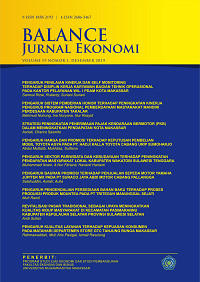THE EFFECT OF FINANCIAL COMPENSATION ON EMPLOYEE PERFORMANCE MEDIATED BY WORK SATISFACTION IN DGT REGIONAL OFFICE OF SOUTH SULAWESI, WEST SULAWESI, AND SOUTH-EAST SULAWESI
DOI: https://doi.org/10.26618/jeb.v17i1.5465
financial compensation, work pressure, job satisfaction, employees’ performance.
Abstract
The aim of this study is to examine and analyze the effect of financial compensation on the performance of employees through job satisfaction in DGT Regional office of South Sulawesi, West Suawesi and South-East Sulawesi.The data were collected by a survey method using questionnaire instruments They grouped into into five groups. Of the 1.701 employee population, there were 352 employees who gave responses. The data were then analyzed using the Structural Equation Model (SEM) with the help of the SPSS AMOS application. The results show that financial compensation does not have a significant effect on employees’ performance, but it has a significant indirect effect through job satisfaction.
References
Bangun, Wilson. 2012. Manajemen Sumber Daya Manusia. Jakarta: Erlangga.
Chenhall, R.H. (2003). Management control systems design within its organizational context: findings from contingency-based research and directions for the future. Accounting Organizations and Society, 28(2), 127–68.
Darma, P. S., & Supriyanto, A. S. (2017). The effect of compensation on satisfaction and employee performance. Management and Economics Journal (MEC-J), 1(1).
Gibson, L., James, Ivancevich, John, M., & Donnely Yunior, James, H. 1996. Organisasi, Perilaku, Struktur – Proses. Alih Bahasa Ir. Nunuk Indiarti, MM. Edisi Kedelapan. Jilid 1. Jakarta: Bina Putra Aksara.
Gibson. 2000. Manajemen Sumber Daya Manusia. Jakarta : PT. Rineka Cipta.
Gomes, Faustino Cardoso, 2003. Manajemen Sumber Daya Manusia, Cetakan kelima, Yogyakarta: Andi Offset.
Greene, C.N., Adam, E.E Jr., & Ebert, R.J. (1985). Management for effective performance. New Jersey: Prentice Hall.
Locke, E. A. (1968). Toward a theory of task motivation and incentives. Organizational behavior and human performance, 3(2), 157–189.
Mathis. (2006). Kinerja Guru. Jakarta: Raja Grafindo.
Mathis, Robert L dan John H Jackson, 2006, Human Resource Management, terjemahan, Edisi Kesepuluh, Jakarta, Salemba Empat.
Marwansyah. (2010). Manajemen Sumber Daya Manusia Edisi Kedua.Bandung:
Maslow, A. H. (1943). A theory of human motivation. Psychological Review, 50(4), 370–396.
Opsahl, R.L. and Dunnett, M.D. (1966). The role of financial compensation in industrial motivation. Psychol. Bullet. 66,94-118.
Owen, R. G. (1991). Organization behavior in education.
Rivai, Veithzal. 2004. Manajemen Sumber Daya Manusia Untuk Perusahaan: Dari Teori Ke Praktek. Jakarta: PT. Raja Grafindo Persada.
Rivai, Veithzal. 2006. Manajemen Sumber Daya Manusia untuk Perusahaan dari Teori ke Praktik . Jakarta. Pt. Raja Grafindo Persada
Rivai, Veitzhal. 2009. Manajemen Sumber Daya Manusia Untuk Perusahaan. Jakarta : Rajawali Pers
Strauss, G., & Sayles, L. (1990). Manajemen Personalia. Jakarta: Penerbit IPPM dan PT. Pustaka Binaman Pressindo.
Subekti, A., & Setyadi, D. (2016). The implication of financial compensation and performance appraisal system to job satisfaction and motivation also employee performance in PT Pupuk Kalimantan Timur Indonesia. International Journal of Business and Management Invention, 5(2), 16-27.
Vroom, V. H. (1964). Work and motivation.
Weibel, A., Rost, K., & Osterloh, M. (2010). Pay for Performance in the Public Sector–Benefits and (Hidden) Costs. Journal of Public Administration Research and Theory, 20(2), 387–412.
Yang, S. B., Brown, G.C., & Moon, B. (2011). Factors leading to corrections officers’ job satisfaction. Public Personnel Management, 40(4), 359–369.













